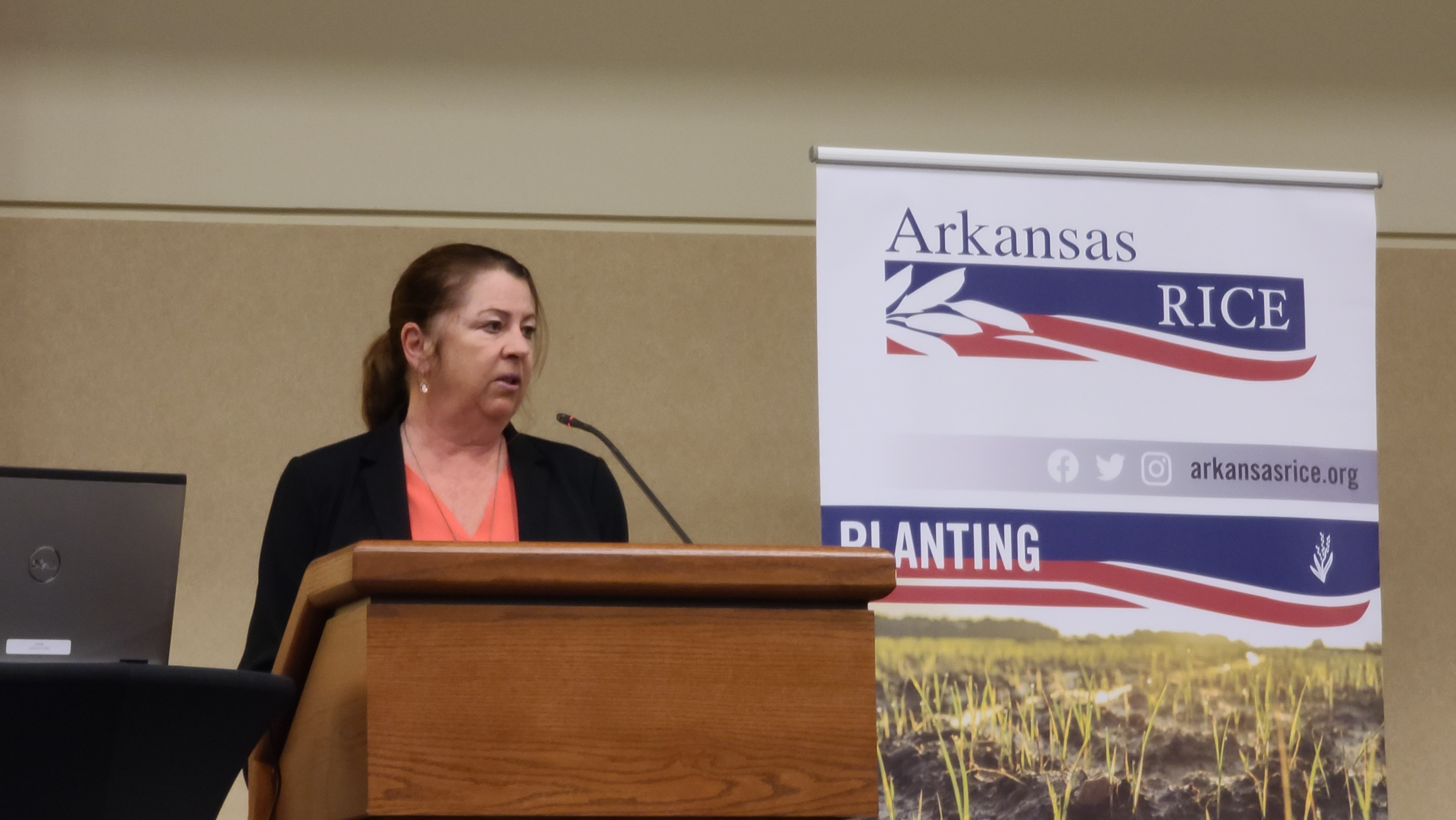 USA Rice CEO Betsy Ward reports on the state of the U.S. rice industry
USA Rice CEO Betsy Ward reports on the state of the U.S. rice industry
Jan 27, 2023
STUTTGART, AR – More than 225 rice growers and industry representatives gathered here yesterday for a joint meeting of the Arkansas Rice Federation and Arkansas Rice Council as planning for the 2023 season and Farm Bill year gets underway.
USA Rice President & CEO Betsy Ward praised the Arkansas congressional delegation that had been so critical in ensuring much-needed emergency assistance to rice farmers in 2022, especially Senator John Boozman who had many Washington and Arkansas staff in attendance.
“We know this didn’t make you whole, but it demonstrates how important you are, and how effective your Congressional delegation and national trade association is,” said Ward. “It also positions us well heading into the Farm Bill that while the legislation has worked in the past, it is not keeping up with the reality of a fast-changing ag economy.”
Arkansas’ third Secretary of Agriculture, Wes Ward, having recently been reappointed by Arkansas’ new governor, Sarah Sanders, addressed the crowd, assuring them that the new administration is well aware of agriculture’s importance to the state and prizes the industry’s economic contribution as well as the sense of pride that it instills in Arkansans.
The event then kicked into educational overdrive with timely panels on the Farm Bill, the state rice check-off, innovation, and new climate-smart programs.
USA Rice Vice President of Policy & Government Affairs Peter Bachmann moderated the legislative panel that featured Fitz Elder, staff director of the U.S. Senate Agriculture Committee, Murray Miller from Congressman Bruce Westerman’s office, and Joe MacFarlane from Congressman Rick Crawford’s office.
“I think a key takeaway from the discussion is that the Farm Bill is a sprawling and immensely important piece of legislation, and we have at least 200 Members of Congress who have never voted on one, so the ag community is going to have their work cut out for them to educate, educate, educate,” said Bachmann.
Arkansas’ rice check-off program was then put under the microscope with moderator Dr. Tim Burcham, director of the Northeast Arkansas Research Center, opening the discussion with a concise history of the program that has not been updated or changed since 1999.
Panelists were Arkansas rice farmer Jeff Rutledge, Vice President of the Division of Agriculture for the University of Arkansas Dr. Deacue Fields, and USA Rice’s Vice President of Domestic Promotion & Communications Michael Klein.
Dr. Fields explained how grower funds are spent to improve rice farming techniques, technology, and varieties, while Klein shared several examples of domestic and international programs that result in new and expanded markets for rice from Arkansas. Rutledge took it all down to the farm level to share how he has personally benefited from his investment in the check-off.
All three sounded the alarm however that because of inflation and reduced acreage, the spending power of check-off dollars, unchanged in more than 20 years, is greatly diminished and the industry is falling behind.
“As Dr. Burcham pointed out, in relative terms, today’s dollar is worth about half what it was when the check-off was last adjusted,” said Rutledge. “We heard great examples today of how that is hurting us – missed market opportunities, and an inability to keep up with critical research.”
The panel was conducted against the backdrop of a recent priority policy recommendation from the Arkansas Farm Bureau that the check-off be adjusted this year. The Ag Council of Arkansas and the Boards of Directors of the two major rice co-ops in Arkansas also support adjusting the check-off.
The innovation panel looked at new smoke management systems, drone technology, and the push for on-farm renewable energy opportunities.
The final panel of the day was moderated by USA Rice Director of Grower Relations Josh Hankins who is overseeing the organization’s $80 million Climate-Smart Commodity program. Joining him was Adam Shea, director of sustainability for Riceland Foods; Jessica Whitaker Allen from Whitaker Grain; and Chris Colclasure, director of the Natural Resources Division for the Arkansas Department of Agriculture.
The panelists explained their varied approaches to getting Biden Administration climate-smart funding into the hands of growers and took questions from the audience about how these new programs – some still being finalized – would effectively function.
Arkansas Rice Executive Director Kelly Robbins, who had opened the program that morning, closed it, thanked all the speakers and attendees, exhibitors, and sponsors, and sent the group to lunch and the Arkansas Rice Council annual business meeting.
“This was an excellent gathering,” said David Gairhan, chair of the Arkansas Rice Federation. “We had more attendees, more sponsorship support from our community, more timely information, and a great showing from our Congressional allies, even though Congress is in session this week. That really tells you something, and I thank everyone for attending.”